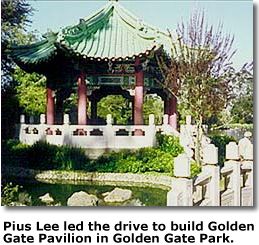
Pius
Lee: Working the system
page 2
proudly shows off a fax of the bill's text sent to him by its author, California state assembly member Mike Honda, with hand-scrawled instructions to review it and then call Honda's office back. Lee has earned respect from both shoppers and shop owners in Chinatown for his stance on the issue.
The Golden Gate Pavilion in Golden Gate Park is another symbol of Lee's successful move to bring Asian-American issues into the American mainstream. A framed poster-sized photo of the traditional Chinese pavilion hangs behind his desk at his real estate company, California Land and Realty, Inc. Lee led the effort to build the palace-like structure in 1981, after being appointed president of the San Francisco-Taipei Sister City Committee by Mayor Dianne Feinstein. "It is the only structure outside Chinatown representing the Chinese American community," boasts Lee.
As a teenager, Lee fled China with his father. They swam to the Portuguese enclave of Macao on the south China coast to avoid the unreasonable persecution they would have faced as landlords in the newly founded communist republic in China. Days later, they moved to Hong Kong, where the younger Lee stayed until moving to San Francisco in 1963 under a refugee support program.
 Once
in America, Lee worked odd jobs and went to school at night to become,
ironically, a licensed real estate agent. He sold houses like pancakes,
in his own words, to Chinese families in the Richmond and Sunset districts,
and achieved what he calls financial independence. Although he made less
than $10,000 in real estate commissions last year, Lee's property holdings
in San Francisco's booming real estate market are substantial. He owns
a home on Marina Boulevard, and buildings in Chinatown that house a dozen
businesses.
Once
in America, Lee worked odd jobs and went to school at night to become,
ironically, a licensed real estate agent. He sold houses like pancakes,
in his own words, to Chinese families in the Richmond and Sunset districts,
and achieved what he calls financial independence. Although he made less
than $10,000 in real estate commissions last year, Lee's property holdings
in San Francisco's booming real estate market are substantial. He owns
a home on Marina Boulevard, and buildings in Chinatown that house a dozen
businesses.
In the next election, San Francisco's Board of Supervisors will again be chosen on a district by district basis, instead of a city-wide basis. This system will strengthen Chinese American influence in certain districts, and may give the growing constituency a shot at another seat on the board. Now, two of the nine seats are filled by Chinese Americans. A third Asian supervisor would bring the board's ratio in line with the actual population breakdown in the city. Lee himself ran for the board once in 1980s and got 25,000 votes. Now he is encouraging people from the younger generation to run. He is, however, working to change the fact that only 16 percent of Asian Americans are actually registered to vote. The Pius Lee Foundation opened a Chinese language school on Clay Street in October last year, which offers free citizenship classes. And instructors also stress the importance of registering to vote.
A cluttered array of tokens and trophies displayed in Lee's office are proof of his global guanxi network that stretches from Washington to Taipei. The most prominent are the individually framed pictures of Lee with President Bill Clinton, Vice President Al Gore, and together with Mayor Brown and California Governor Gray Davis. Lee praises the Democratic party for its policies toward minorities and poor people. He also admits allying himself with the party out of sheer practicality. "When you play politics in San Francisco, there is no room for Republicans," he concedes. Nevertheless, Lee was encouraged to see a fellow Chinese, Republican Matt Fong, in the race for the California seat in the U.S. Senate last year.
Lee's guanxi extends all the way back to Asia too. Lee Teng-hui, then-mayor of the Taiwan capital of Taipei and now the island-state's president, helped make the pavilion project happen. Pius Lee points to a picture of himself with Taiwan's president, recalling the days when he didn't have to schedule a meeting three months in advance to get together with his old friend.
Despite the connections Lee maintains with Asia, he still feels that coming to America was the best thing he ever did. Asked to speculate what his life might be like if he had decided to stay in Hong Kong, he muses: "This city has been good to me, I came here with nothing. I don't know what I would be doing over there if I had stayed. Probably I would be lucky just to have a job!"
Peter
Louis
Feng shui master
Phoebe
Man
21st century artist
Martin
Yan
Celebrity chef
Coming soon
In
late May, journalism students from
UC Berkeley will travel to
Hong Kong. Watch for their reports.